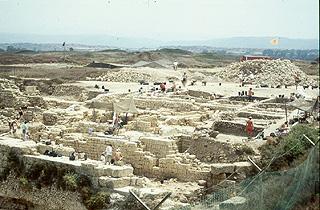UC Berkeley Web Feature
 |
The Tel Dor site (area H) shown during a 1999 excavation |
Tel Dor, Israel archaeological project (also known as the 'Club Med Dig') seeking summer volunteers
BERKELEY – As winter settles in, Professor Andrew Stewart is thinking of summer. He's not daydreaming, he's planning.
The professor of ancient Mediterranean art and archaeology in the Departments of History of Art and Classics in the College of Letters & Science, has begun his annual recruitment of volunteers for the UC Berkeley summer excavation that he directs at Tel Dor, Israel. Considering the expedition's nickname of the "Club Med Dig," Stewart's job shouldn't be too tough.
Stewart notes that volunteers live in cabins at a beachside hotel resort next to the site, about 20 miles south of Haifa. Mornings are spent digging through the dirt, looking for treasures. A breakfast-time dip in the ocean is part of the routine.
But the real draw, Stewart says, is the hunt.
"We're looking for some great results this season," Stewart says, "You never know when something important will show up," he says. "It may be right under your feet."
Finds at Dor have included Greek and Roman temple columns and fragments of superstructure, a headless statue of the Greek winged goddess Victory, cylinder seals from the Assyrian era, terracotta figurines from the Persian occupation, well preserved stone-walled homes from the Hellenistic period, and mosaic floors dating to Roman times.
One of the few natural harbors on Israel's Mediterranean coast, and a spectacularly beautiful location, Dor is one of Israel's largest archaeological sites. A city of up to 10,000 people in its heyday, it is now a tall mound of deposits about 75 feet high and 75 acres in area. The mound contains the remains of almost every civilization that ever passed through the Middle East, beginning with the Canaanites who settled there around 2000 B.C.
The Hebrew University of Jerusalem launched the Dor excavation in 1980 and the UC Berkeley team joined in 1985. The Graduate Theological Union, Cornell University, the University of Washington at Seattle, Haifa University, and the Weizmann Institute of Science also participate in the dig.
Stewart says volunteers must be at least 18 years old, reasonably fit and ready to work and learn. Although he prefers volunteers to sign on for the whole four-and-a-half week assignment from June 29 to July 31, those offering to work for a minimum of two weeks also are accepted.
Volunteers come from all over the world, and Stewart says he has even recruited people on the plane while flying to Israel. But he says it is best to sign on early in order to get prepared, to start reading about the site, and to learn about what's in store.
The cost to volunteers is $2625 for the full field season; it is all-inclusive except for airfare, and can be pro-rated for shorter periods of participation. More information about volunteer applications and student discounts is online .
To contact Stewart, call (510) 642-4524 or e-mail him at astewart@socrates.berkeley.edu.

